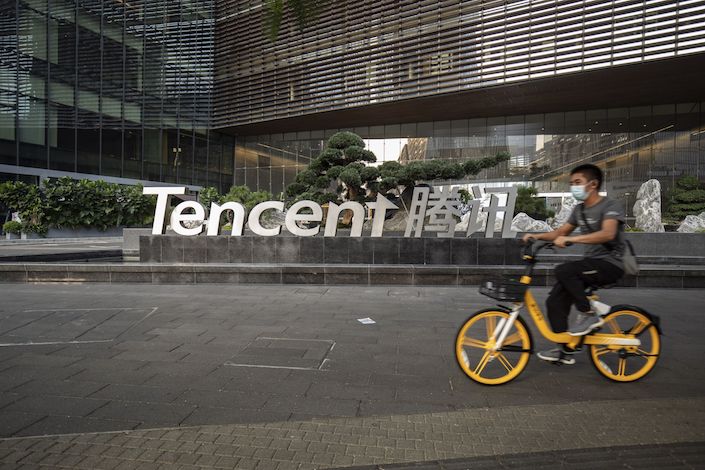Tencent Profit Beats Expectations Despite Tightening Scrutiny of Big Tech

(Bloomberg) — Tencent Holdings Ltd. played down the impact of Beijing’s heightened scrutiny of China’s biggest internet firms, saying a potential revamp of its $120 billion fintech wing should have little impact on its business.
President Martin Lau acknowledged founder Pony Ma called on regulators recently but said that it was voluntary and part of a series of regular meetings. Executives reiterated that the company has always been cautious and compliant with fintech regulations and it will stick with its normal practice of acquiring minority stakes in Chinese startups, while regulators pore over past deals.
Beijing is widening a crackdown on the country’s largest big tech corporations, fearful of their growing clout after years of relatively unfettered expansion. Regulators are said to be considering forcing Tencent to overhaul its promising fintech division in a similar fashion to Jack Ma’s Ant Group Co. This month, President Xi Jinping warned he will go after “platform” companies that amass data and market power, a sign that the internet crackdown isn’t limited to Ant and its backer Alibaba Group Holding Ltd.
“We have always been very focused on compliance and we will continue to operate strictly in compliance with the rules and regulations,” Lau told reporters on a conference call. Any requirements to form a financial holding company will not have an impact on its business, he added.
Top executives on Wednesday repeatedly stressed they will go all out to comply with regulations as the company issued its latest earning results. Tencent, which has acquired stakes in hundreds of startups over the years, is now reviewing past investments to ensure they comply with antitrust requirements. It pledged to safeguard user privacy even as it acknowledged the need to heed Beijing’s call to share data.
“Tencent is trying to reassure investors that its microloan business has substantive differences from Ant,” said Michael Norris, research manager at Shanghai-based consultancy AgencyChina. “While Tencent may avoid the same level of scrutiny as Ant Group, there may be some bumps along the road. Potentially, issues could include scrutiny of data collection, or regulatory attention toward promotion and cross-sale of financial products,” he added.
Sales rose 26% to 133.7 billion yuan ($20.5 billion) in the three months ended December, versus the 133.1 billion yuan average analyst forecast. Net income came in at 59.3 billion yuan, with one-time gains contributing more than half its profit. That compared with the 32.9 billion yuan projected.
It’s unclear how far Beijing intends to go in its bid to rein in Tencent and its peers. In the short run, investors will likely focus more on how the world’s largest game publisher could sustain a pandemic-induced entertainment boom, while delving deeper into newer businesses like advertising and payments.
All these services rely on WeChat, the avenue through which Tencent reaches users and markets products, including its biggest gaming hits like Honor of Kings and PUBG Mobile. Through the mini-program model it championed, WeChat hosted $240 billion worth of transactions for 400 million daily users last year.
Now a new short-video feed inside the all-purpose platform is tasked with helping the Shenzhen-based company fend off arch-rival ByteDance Ltd., which has been luring eyeballs away with TikTok’s China twin Douyin.
Revenues from online games grew by 29% in the fourth quarter — the slowest pace in about a year — helped by a surge in international sales of game titles like Peacekeeper Elite and the newly-launched Moonlight Blade Mobile. That slowdown may spur concerns about the longevity of the pandemic-era global gaming boom.
Sales from social networks climbed 27%, in part after Tencent consolidated contributions from Huya Inc. Online advertising revenues increased 22%.
Fintech businesses — the division that oversees Tencent’s various money operations as well as cloud — saw revenue climb 29%, due primarily to growth in payments and wealth management services.
Support quality journalism in China. Subscribe to Caixin Global starting at $0.99.
Follow the Chinese markets in real time with Caixin Global’s new stock database.

- PODCAST
- MOST POPULAR






